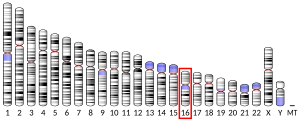From Wikipedia, the free encyclopedia
Protein-coding gene in the species Homo sapiens
G protein-coupled receptor 114 is a protein encoded by the ADGRG5 gene .[ 5] [ 6] [ 7] adhesion GPCR family.[ 8] [ 9] (GAIN) domain.[ 10]
Tissue distribution [ edit ] GPR114 mRNA is specifically expressed in human eosinophils as well as in mouse lymphocytes, monocytes, macrophage, and dendritic cells.[ 11]
The cyclic adenosine monophosphate (cAMP) assay in overexpressing HEK293 cells has demonstrated coupling of GPR114 to Gαs protein.[ 12]
^ a b c GRCh38: Ensembl release 89: ENSG00000159618 – Ensembl , May 2017^ a b c GRCm38: Ensembl release 89: ENSMUSG00000061577 – Ensembl , May 2017^ "Human PubMed Reference:" . National Center for Biotechnology Information, U.S. National Library of Medicine .^ "Mouse PubMed Reference:" . National Center for Biotechnology Information, U.S. National Library of Medicine .^ "Entrez Gene: GPR114 G protein-coupled receptor 114" .^ Fredriksson R, Lagerström MC, Höglund PJ, Schiöth HB (November 2002). "Novel human G protein-coupled receptors with long N-terminals containing GPS domains and Ser/Thr-rich regions" . FEBS Letters . 531 (3): 407–414. Bibcode :2002FEBSL.531..407F . doi :10.1016/S0014-5793(02)03574-3 PMID 12435584 . S2CID 7449692 . ^ Hamann J, Aust G, Araç D, Engel FB, Formstone C, Fredriksson R, et al. (April 2015). "International Union of Basic and Clinical Pharmacology. XCIV. Adhesion G protein-coupled receptors" . Pharmacological Reviews . 67 (2): 338–367. doi :10.1124/pr.114.009647 . PMC 4394687 PMID 25713288 . ^ Stacey M, Yona S (2011). Adhesion-GPCRs: Structure to Function (Advances in Experimental Medicine and Biology) . Berlin: Springer. ISBN 978-1-4419-7912-4 ^ Langenhan T, Aust G, Hamann J (May 2013). "Sticky signaling--adhesion class G protein-coupled receptors take the stage". Science Signaling . 6 (276): re3. doi :10.1126/scisignal.2003825 . PMID 23695165 . S2CID 6958640 . ^ Araç D, Boucard AA, Bolliger MF, Nguyen J, Soltis SM, Südhof TC, et al. (March 2012). "A novel evolutionarily conserved domain of cell-adhesion GPCRs mediates autoproteolysis" . The EMBO Journal . 31 (6): 1364–1378. doi :10.1038/emboj.2012.26 . PMC 3321182 PMID 22333914 . ^ Hamann J, Aust G, Araç D, Engel FB, Formstone C, Fredriksson R, et al. (Apr 2015). "International Union of Basic and Clinical Pharmacology. XCIV. Adhesion G protein-coupled receptors" . Pharmacological Reviews . 67 (2): 338–367. doi :10.1124/pr.114.009647 . PMC 4394687 PMID 25713288 . ^ Gupte J, Swaminath G, Danao J, Tian H, Li Y, Wu X (April 2012). "Signaling property study of adhesion G-protein-coupled receptors" . FEBS Letters . 586 (8): 1214–1219. Bibcode :2012FEBSL.586.1214G . doi :10.1016/j.febslet.2012.03.014 PMID 22575658 . S2CID 3020230 .




